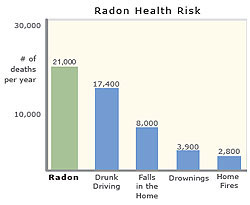AllPro Radon Services Co. Serving Maryland and Pennsylvania York and Lancaster, PA & Bel Air and Baltimore, MD
Radon - The Silent Killer

Source: U.S. EPA
- The U.S.Environmental Protection Agency (EPA) estimates that more people die as a result to radon exposure than are killed by drunk driving. It is estimated to cause over 20,000 deaths annually in the United States.
- The U.S. Surgeon General has issued a National Health Advisory urging Americans to prevent this silent killer from accumulating to dangerous levels in the home.
- The U.S.Environmental Protection Agency (EPA) and the U.S. Surgeon General strongly recommend taking further action when the home's radon test results are 4.0 pCi/L or greater.
Lowering Radon Levels
- If your radon levels are greater than 4.0 pCi/L, the U.S. EPA recommends taken action to reduce that level.
- Mitigating even very high levels of radon can usually be accomplished relatively inexpensively.
- The average cost for a radon mitigation system is $1,200.00 although this can range from about $800.00 to $2,500.00.
- The higher a home's radon level the greater the health risk to you and your family.
- Reducing your radon levels can be done easily, effectively and fairly inexpensively.
- Even homes with very high radon levels can be reduced below 4.0 pCi/L. For further information about reducing elevated radon levels please refer to the EPA's Consumer's Guide to Radon Reduction.
Test Result Greater Than 100 pCi/L
- All Pennsylvanians who have tested their homes or other buildings for radon and found screening levels greater than 100 pCi/L, are entitled to receive a free short-term confirmation test kit from the Bureau of Radiation Protection.
- This test kit will be mailed to those eligible by express mail. For this free service, please call 1 (800) 237-2366 or (717) 783-3594.
How to test for high radon levels
- Homeowners and occupants of a building can perform their own test using a PA DEP approved radon test device.
-
- These can be purchased at a home center or hardware store, or
- From a Pennsylvania certified laboratory.
- A certified radon measurement specialist performs a radon survey.
- Check the average radon level of your Pennsylvania neighborhood by zip code here.
Post Mitigation Confirmatory Testing
- If an active (fan-powered) radon mitigation system has been installed in your home within the last year, you are entitled to receive a free, long-term radon test kit (Alpha Track Detector). These can be placed for up to 365 days.
Send- Proof of installation of system
- Copy of post-mitigation test result
To- DEP Bureau of Radiation Protection
P.O. Box 8469
Harrisburg, PA 17105-8467 - or fax to Radon Division, (717) 783-8965
- Please allow 6-8 weeks for processing.
When do I need a certified radon test?
- Pennsylvania law requires that anyone performing radon testing for the public, other than the homeowner or occupant of a building, be certified by the Department of Environmental Protection. If you are buying a home in the York, Harrisburg, Lancaster or any other Pennsylvania real estate market, it is highly advisable to get a radon test when requesting a home inspection. If high levels are found it is easy and relatively inexpensive to fix.
- To ensure high quality accurate radon testing, AllPro Radon Services Co. recommends that all radon tests conducted for Maryland real estate transactions be performed by a certified radon tester.
- We also provide testing for any homeowner not comfortable conducting their own home radon test.
- Our Radon Measurement Specialist is certified by the PA DEP to provide radon testing in Pennsylvania and we use continuous radon monitors to conduct all radon surveys. Radon tests performed in Maryland are performed in accordance with the same EPA based protocols followed when conducting Pennsylvania radon tests.
-
- PA DEP Certification #2677
- IAC2 Cert. #IAC2-01-5773
AllPro Radon Services recommends that the dwelling be re-tested for the following cases:
- If the dwelling was mitigated, retest every two years.
- A new addition is added.
- An alteration is made that could change the ventilation pattern.
- Major cracks or penetrations occur in the foundation walls or slab.
- Significant nearby construction blasting or earthquakes occur.
- Changes are made or happen to an installed mitigation system.
- Occupation of a ground contact area that was not previously tested.